Scoliosis Surgery
When surgery is needed to treat severe curvature of the spine, we offer the very latest methods and surgical expertise, all in a setting specially designed for kids and teens. We use growing rods for younger children who are still growing, and spinal fusion with customized rods for teens.
Spinal fusion surgery involves fusing vertebrae together to stabilize the curved part of the spine and correct the deformity. Rods may also be implanted to further correct the spine. Our orthopaedic surgeons are highly experienced in performing this procedure and have fine-tuned the most innovative and successful approach.
Why CHOC for Scoliosis Surgery
CHOC is one of the first hospitals to offer customized spinal rods for pediatric patients. This new technology allows a surgeon to design and manufacture individualized rods prior to surgery. Using customized rods potentially leads to better long-term outcomes following scoliosis surgery.
Our surgeons also use sophisticated software to plan a patient’s surgery ahead of time and simulate the procedure, to prepare for every detail. We share these surgical plans with patients and their families ahead of time so you will know what to expect.
CHOC strives to provide the best experience for patients. We continually implement quality initiatives that benefit our patients, including shorter hospital stays and improved mental health after surgery.
For more information about what to expect during scoliosis surgery, download our Idiopathic Scoliosis Patient Guide and watch our video series.
What to Expect
One week before surgery, do not take any aspirin, ibuprofen, Motrin, Aleve or any aspirin-containing medicines. Tylenol or acetaminophen is okay. Your doctor will tell you how long to avoid food or drink prior to surgery. In most cases, we recommend no food or drink after midnight the night before.
For the two nights before your surgery, you will need to wash your back with a special soap that helps prevent infections. This soap is called Hibiclens and is available at any pharmacy without a prescription. Because it’s hard to properly scrub your back on your own, you will probably need to have a parent or friend help you. Learn how to wash your back prior to surgery.
• Comfortable, loose clothes like gym shorts, yoga pants or pajamas. Make sure you bring tops that don’t have buttons or zippers in the back. We will provide you slippers, but you also may bring your own.
• A favorite pillow, blanket or stuffed animal to make your stay more comfortable.
• Toothbrush and toothpaste.
• Comb or brush.
• Books, magazines, music, a laptop/tablet, games and other items to keep you occupied. All of our rooms have WiFi available.
• Movies, as many of our rooms have DVD players.
• Because of the medications used for surgery, many girls have their menstrual cycle while in the hospital, and you may want to bring feminine hygiene products just in case.
CHOC Children’s Hospital is located at 1201 W. La Veta Ave. in Orange, Ca. You may check in at the main entrance of the hospital, located near the intersection of Pepper Street and La Veta Avenue. Parking is located immediately west of the hospital. Valet parking is also available at the entrance. Even though you will be in the hospital for an extended period of time, we recommend that you leave your suitcase in your car until after the surgery. This will prevent your family from having to keep track of many items until you’re settled. You will check in at the Admitting desk, near the main entrance on the first floor of the hospital. Please bring your insurance card. After registration, you will be escorted to the Procedure Center on the third floor of the hospital.
It may seem like you’re waiting a long time in your pre-op room, but this is so your surgery team can get everything prepared for you. You will be introduced to your surgeon and your anesthesiologist at this time. You are welcome to bring a book, tablet or game to stay occupied and keep your mind off of your surgery. We ask that you limit your number of visitors in this room to your parents or guardians, so that you can stay at ease.
When it’s time for your surgery, your parents will say goodbye and you will be wheeled into the operating room, where you will be given medicine that will make you fall asleep. Your anesthesiologist will be at the head of your bed throughout the entire procedure, to make sure you always have enough of this medicine to stay asleep. Your parents will wait for you in the Procedure Center lobby and they will be updated on your progress regularly during the surgery, which will take 5-7 hours. They can also watch your progress on our digital tracking board in the waiting room. Once given the go ahead, your parents can ask for a beeper and visit the amenities on the second floor while they wait. Parents are asked to remain on campus during surgery.
When you wake up from surgery, you will be lying on your back in a bed in a recovery room. Anesthesia has different effects on different patients, and you may wake up feeling grumpy, sad, confused or nauseous. A tube similar to an IV will be inserted in your neck and will be removed the next day. You will also wake up with a catheter inserted into your bladder, so you don’t have to get up to go to the bathroom. This will be removed after you are able to walk and use the restroom. The bed you’re in will be your bed throughout the rest of your hospital stay.
After surgery, your parents can visit you in the recovery room until you’re ready to be moved to your hospital room on the third floor for the rest of your recovery. In most cases, we are able to provide you a private room to give you privacy and comfort. Your parents can continue to stay with you in this room. Additional visitors are welcome to see you between 8 a.m. and 8 p.m. daily. At the beginning of your stay, we recommend limiting your visitors so you can get your rest.
Pain Management
Scoliosis surgery is a painful procedure. We try to keep you as comfortable as possible, but we need your help. You must be very honest with your nurses and doctors and tell them how you’re feeling. For many patients, the third day of recovery is when you begin to feel better and have gotten through the worst.
Your pain medication at first will be administered through a PCA pump – this stands for Patient-Controlled Analgesia pump. You will be given a remote that gives you pain medicine at the push of a button. There are limits that prevent you from taking too much medicine. It’s important that only you administer this, not your parents. After several days with the PCA, you will be transitioned to oral pain medication. You may also be given pain medication through an ON-Q pump. This pump is a portable system that delivers numbing medicine to your surgery site.
Our child life specialists will be available to help you at any time, and they are skilled at helping you cope with pain using guided imagery, deep breathing and distraction. Download our coping kit for pain management techniques.
Physical Therapy
A physical therapist will visit you two or three times a day, each time helping you move a little bit more. Moving around after surgery is very important to help your body heal, minimize pain and have bowel movements.
Your physical therapist will start by simply showing you how to roll over in bed, and slowly you will graduate to getting out of bed, walking to the door and walking down the hallway or up stairs.
Constipation
Another normal side effect is constipation. Don’t feel anxious or embarrassed – this happens for everyone. In the days leading up to your surgery, try to avoid foods like breads and pastas that might add to the constipation, and eat as many fiber-rich foods like fruits and vegetables as you can. We can help you get your bowels moving by using a suppository, which is a small medication that is put in your bottom, or an enema, which is fluid that is squeezed in your bottom.
Food and Appetite
Due to the medicines you will be on, it’s very normal not to feel hungry or desire the foods you usually like. Our dietitians will help you get the nutrients you need and slowly get you back to your normal diet. Room service is conveniently available from your room. Guests may also order from the menu for a $5 fee.
Preventing Boredom
You will be in the hospital for several days, and boredom can often make you more anxious or increase your pain. At CHOC, we have created an environment just for you, where you can enjoy pet therapy, a teen room, Seacrest Studio, gaming systems and laptops, and more. We also recommend that you bring your favorite books, games, movies and music to keep occupied.
Your surgery incisions will take time to heal, and it’s important to prevent infection. You may have gauze and tape on your back, or thin strips on top of your skin. Keep the area clean and dry, and follow all instructions from your doctor. If you have symptoms such as a fever above 101.5 degrees, drainage, redness or increasing pain or discomfort, call your doctor immediately. To prevent scarring, limit the amount of sun exposure to the scar and apply sunscreen when appropriate.
It’s very likely that you will continue to have problems with constipation for a short time. We recommend taking over-the-counter laxatives, as well as eating fiber-rich foods like prune juice. Your body will also need a lot of foods with protein and Vitamin C to heal.
Most patients can take a shower two weeks after surgery, but check with your doctor first. Do not bathe in a tub until the wound is completely healed.
Your physical therapist will tell you how to continue moving at home to help with the healing process. Try to walk a minimum of 30 minutes a day, even if you do it in increments. Activities that twist or rotate your spine should be limited until 3 months after surgery. After 3 months, light exercise such as walking on a treadmill, swimming or using an elliptical or exercise bike, is okay. You should not participate in gym or team sports for up to 6 months.
If possible, do not go to the dentist for 6 months after surgery. If you must go, ask your dentist for antibiotics to prevent infection.
Hear from real patients and families about the reality of scoliosis surgery.
Having scoliosis surgery can be tough. Hear from two scoliosis patients, as they share their stories and insider tips for how to deal.
Scoliosis surgery can be hard on the parents, too. Hear from two real moms of scoliosis patients, as they share their stories and advice.
Make an Appointment
To make an appointment with a pediatric orthopaedic surgeon to discuss scoliosis surgery, please call 888-770-2462. You may need a referral from your primary care doctor and insurance authorization.
Preparing for Scoliosis Surgery at CHOC
We look forward to taking care of you during your orthopaedic surgery. Our team will partner with you and your family to provide excellent care every step of the way. To help prepare you, we have developed a patient guide for you to download, as well as a series of informational videos to answer some of the most frequently asked questions.
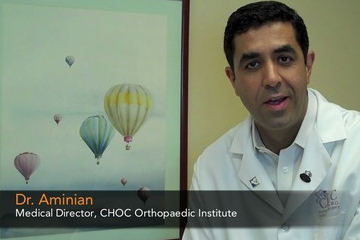
Meet Afshin Aminian, MD, as he talks about having scoliosis surgery at CHOC. He'll introduce this series of videos we made just for teens.
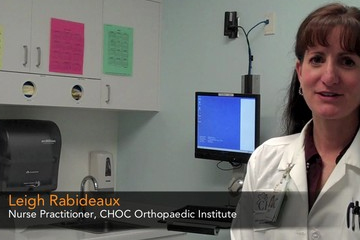
For the two nights right before your scoliosis surgery, you will need to wash your back with a special soap that helps prevent infections.
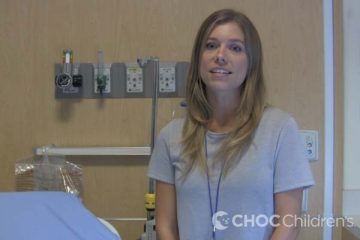
A child life specialist explains what to expect in the pre-operative unit of the hospital before you have scoliosis surgery.
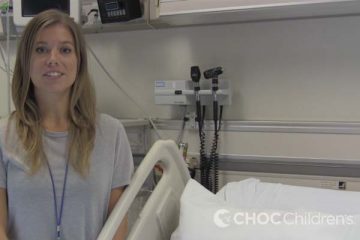
A child life specialist explains what to expect in the recovery room after you have scoliosis surgery.
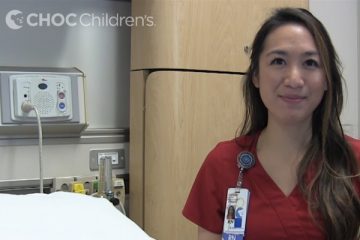
Scoliosis surgery isn't just hard on your spine. Your pain meds can mess with your ability to go to the bathroom. See why it's so important after surgery.
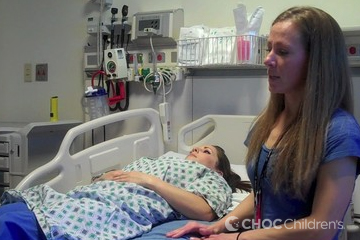
After scoliosis surgery it's important to know how to get in and out of bed, stand up, and sit in a chair without breaking your precautions.
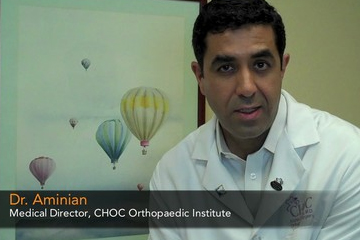
After scoliosis surgery activity & diet is very important explains Dr. Afshin Aminian. Feeling tired all the time is totally normal after scoliosis surgery.
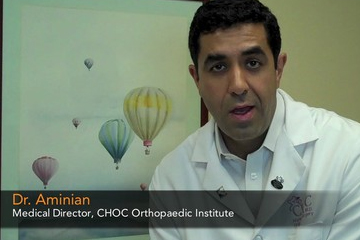
Dr. Afshin Aminian talks about pain management after having scoliosis surgery. Learn more about what to expect & how to deal with pain once you come home.
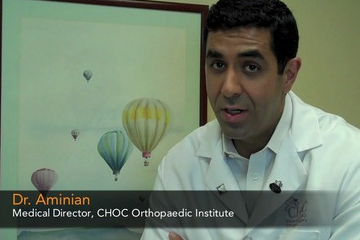
Dr. Afshin Aminian talks about the effects of pain medication on bowel movements after scoliosis surgery. Pooping is important after your spine surgery.
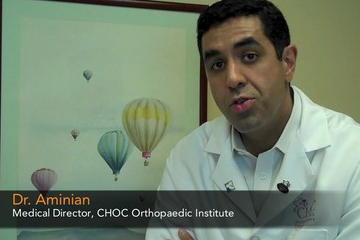
Dr. Afshin Aminian talks about wound care after scoliosis surgery and infection prevention.
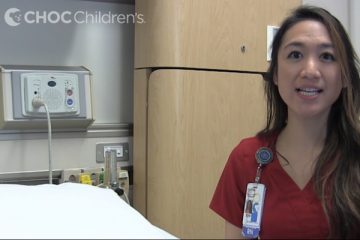
A CHOC nurse offers a quick tour of what the patient rooms look like on our hospital floors for scoliosis surgery patients.
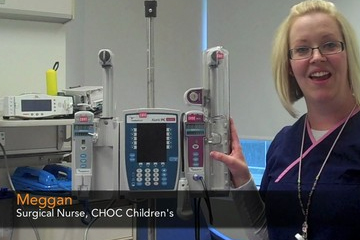
A CHOC nurse explains how your pain is managed when you are in the hospital after your scoliosis surgery, using a PCA (patient-controlled analgesia).















